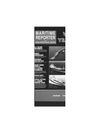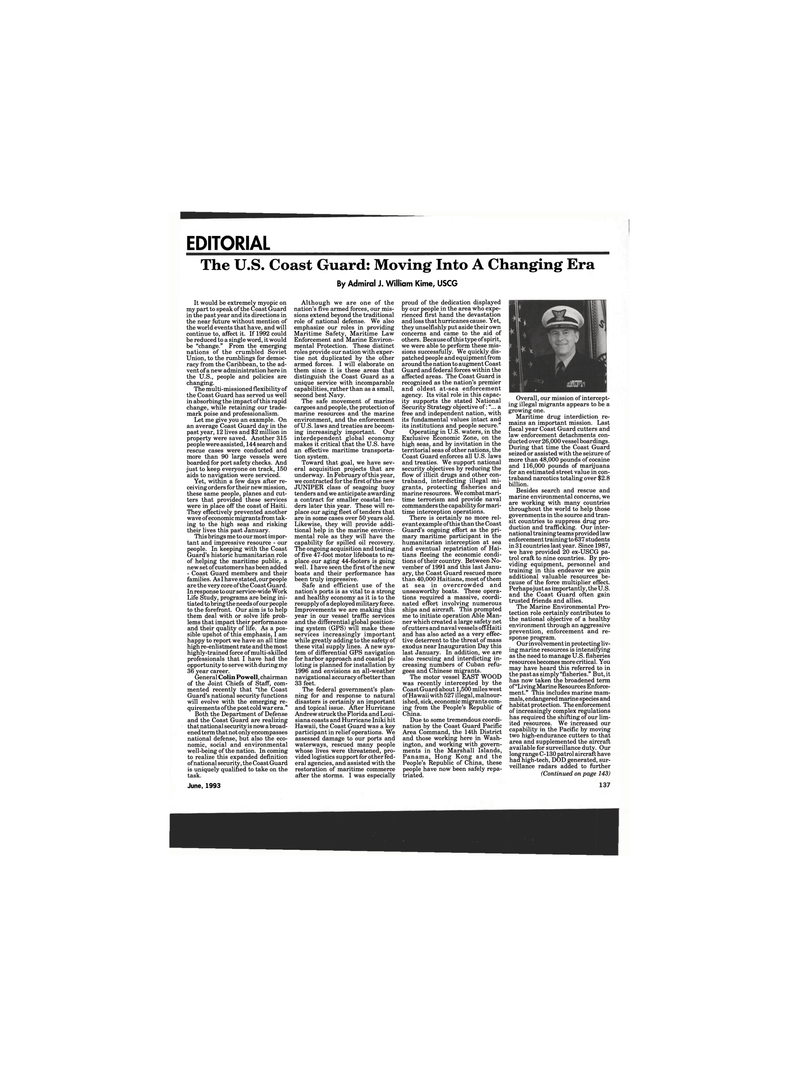
Page 137: of Maritime Reporter Magazine (June 1993)
Read this page in Pdf, Flash or Html5 edition of June 1993 Maritime Reporter Magazine
EDITORIAL
The U.S. Coast Guard: Moving Into A Changing Era
By Admiral J. William Kime, USCG
It would be extremely myopic on my part to speak of the Coast Guard in the past year and its directions in the near future without mention of the world events that have, and will continue to, affect it. If 1992 could be reduced to a single word, it would be "change." From the emerging nations of the crumbled Soviet
Union, to the rumblings for democ- racy from the Caribbean, to the ad- vent of a new administration here in the U.S., people and policies are changing.
The multi-missioned flexibility of the Coast Guard has served us well in absorbing the impact of this rapid change, while retaining our trade- mark poise and professionalism.
Let me give you an example. On an average Coast Guard day in the past year, 12 lives and $2 million in property were saved. Another 315 people were assisted, 144 search and rescue cases were conducted and more than 90 large vessels were boarded for port safety checks. And just to keep everyone on track, 150 aids to navigation were serviced.
Yet, within a few days after re- ceiving orders for their new mission, these same people, planes and cut- ters that provided these services were in place off the coast of Haiti.
They effectively prevented another wave of economic migrants from tak- ing to the high seas and risking their lives this past January.
This brings me to our most impor- tant and impressive resource - our people. In keeping with the Coast
Guard's historic humanitarian role of helping the maritime public, a new set of customers has been added - Coast Guard members and their families. As I have stated, our people are the very core of the Coast Guard.
In response to our service-wide Work
Life Study, programs are being ini- tiated to bring the needs of our people to the forefront. Our aim is to help them deal with or solve life prob- lems that impact their performance and their quality of life. As a pos- sible upshot of this emphasis, I am happy to report we have an all time high re-enlistment rate and the most highly-trained force of multi-skilled professionals that I have had the opportunity to serve with during my 36 year career.
General Colin Powell, chairman of the Joint Chiefs of Staff, com- mented recently that "the Coast
Guard's national security functions will evolve with the emerging re- quirements of the post cold war era."
Both the Department of Defense and the Coast Guard are realizing that national security is now a broad- ened term that not only encompasses national defense, but also the eco- nomic, social and environmental well-being of the nation. In coming to realize this expanded definition of national security, the Coast Guard is uniquely qualified to take on the task.
Although we are one of the nation's five armed forces, our mis- sions extend beyond the traditional role of national defense. We also emphasize our roles in providing
Maritime Safety, Maritime Law
Enforcement and Marine Environ- mental Protection. These distinct roles provide our nation with exper- tise not duplicated by the other armed forces. I will elaborate on them since it is these areas that distinguish the Coast Guard as a unique service with incomparable capabilities, rather than as a small, second best Navy.
The safe movement of marine cargoes and people, the protection of marine resources and the marine environment, and the enforcement of U.S. laws and treaties are becom- ing increasingly important. Our interdependent global economy makes it critical that the U.S. have an effective maritime transporta- tion system.
Toward that goal, we have sev- eral acquisition projects that are underway. In February of this year, we contracted for the first of the new
JUNIPER class of seagoing buoy tenders and we anticipate awarding a contract for smaller coastal ten- ders later this year. These will re- place our aging fleet of tenders that are in some cases over 50 years old.
Likewise, they will provide addi- tional help in the marine environ- mental role as they will have the capability for spilled oil recovery.
The ongoing acquisition and testing of five 47-foot motor lifeboats to re- place our aging 44-footers is going well. I have seen the first of the new boats and their performance has been truly impressive.
Safe and efficient use of the nation's ports is as vital to a strong and healthy economy as it is to the resupply of a deployed military force.
Improvements we are making this year in our vessel traffic services and the differential global position- ing system (GPS) will make these services increasingly important while greatly adding to the safety of these vital supply lines. A new sys- tem of differential GPS navigation for harbor approach and coastal pi- loting is planned for installation by 1996 and envisions an all-weather navigational accuracy of better than 33 feet.
The federal government's plan- ning for and response to natural disasters is certainly an important and topical issue. After Hurricane
Andrew struck the Florida and Loui- siana coasts and Hurricane Iniki hit
Hawaii, the Coast Guard was a key participant in relief operations. We assessed damage to our ports and waterways, rescued many people whose lives were threatened, pro- vided logistics support for other fed- eral agencies, and assisted with the restoration of maritime commerce after the storms. I was especially proud of the dedication displayed by our people in the area who expe- rienced first hand the devastation andlossthathurricanescause. Yet, they unselfishly put aside their own concerns and came to the aid of others. Because of this type of spirit, we were able to perform these mis- sions successfully. We quickly dis- patched people and equipment from around the nation to augment Coast
Guard and federal forces within the affected areas. The Coast Guard is recognized as the nation's premier and oldest at-sea enforcement agency. Its vital role in this capac- ity supports the stated National
Security Strategy objective of:"... a free and independent nation, with its fundamental values intact and its institutions and people secure."
Operating in U.S. waters, in the
Exclusive Economic Zone, on the high seas, and by invitation in the territorial seas of other nations, the
Coast Guard enforces all U.S. laws and treaties. We support national security objectives by reducing the flow of illicit drugs and other con- traband, interdicting illegal mi- grants, protecting fisheries and marine resources. We combat mari- time terrorism and provide naval commanders the capability for mari- time interception operations.
There is certainly no more rel- evant example of this than the Coast
Guard's ongoing effort as the pri- mary maritime participant in the humanitarian interception at sea and eventual repatriation of Hai- tians fleeing the economic condi- tions of their country. Between No- vember of 1991 and this last Janu- ary, the Coast Guard rescued more than 40,000 Haitians, most of them at sea in overcrowded and unseaworthy boats. These opera- tions required a massive, coordi- nated effort involving numerous ships and aircraft. This prompted me to initiate operation Able Man- ner which created a large safety net of cutters and naval vessels off Haiti and has also acted as a very effec- tive deterrent to the threat of mass exodus near Inauguration Day this last January. In addition, we are also rescuing and interdicting in- creasing numbers of Cuban refu- gees and Chinese migrants.
The motor vessel EAST WOOD was recently intercepted by the
Coast Guard about 1,500 miles west of Hawaii with 527 illegal, malnour- ished, sick, economic migrants com- ing from the People's Republic of
China.
Due to some tremendous coordi- nation by the Coast Guard Pacific
Area Command, the 14th District and those working here in Wash- ington, and working with govern- ments in the Marshall Islands,
Panama, Hong Kong and the
People's Republic of China, these people have now been safely repa- triated.
Overall, our mission of intercept- ing illegal migrants appears to be a growing one.
Maritime drug interdiction re- mains an important mission. Last fiscal year Coast Guard cutters and law enforcement detachments con- ducted over 26,000 vessel boardings.
During that time the Coast Guard seized or assisted with the seizure of more than 48,000 pounds of cocaine and 116,000 pounds of marijuana for an estimated street value in con- traband narcotics totaling over $2.8 billion.
Besides search and rescue and marine environmental concerns, we are working with many countries throughout the world to help those governments in the source and tran- sit countries to suppress drug pro- duction and trafficking. Our inter- national training teams provided law enforcement training to 637 students in 31 countries last year. Since 1987, we have provided 20 ex-USCG pa- trol craft to nine countries. By pro- viding equipment, personnel and training in this endeavor we gain additional valuable resources be- cause of the force multiplier effect.
Perhaps just as importantly, the U.S. and the Coast Guard often gain trusted friends and allies.
The Marine Environmental Pro- tection role certainly contributes to the national objective of a healthy environment through an aggressive prevention, enforcement and re- sponse program.
Our involvement in protecting liv- ing marine resources is intensifying as the need to manage U.S. fisheries resources becomes more critical. You may have heard this referred to in the past as simply "fisheries." But, it has now taken the broadened term of "Living Marine Resources Enforce- ment." This includes marine mam- mals, endangered marine species and habitat protection. The enforcement of increasingly complex regulations has required the shifting of our lim- ited resources. We increased our capability in the Pacific by moving two high-endurance cutters to that area and supplemented the aircraft available for surveillance duty. Our long range C-130 patrol aircraft have had high-tech, DOD generated, sur- veillance radars added to further (Continued on page 143)
June, 1993 139

 136
136

 138
138
